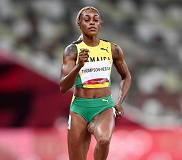Photo: Justin Gatlin has returned from a second drug suspension to run some of the fastest times of his career.
The world of international sports and sporting disciplines is far removed from the days of amateurism. It has now grown to be the sole profession of some of the richest men and women on earth.
Elite athletes can earn tens of millions of dollars every year in prize money alone, and millions more in sponsorships and endorsements. The lure of success is great and so too the temptations to get that success by any means necessary. thus we often see athletes from all sports trying to get an unfair advantage in their drive to be the greatest amongst their respective fields.
The love or desire for fame and fortune has triggered “an influx of drug cheaters in the more modern time”. The penalties for cheating vary anywhere from a public warning to a lifetime ban from the various sports.
Nobody loves a cheater, but does an athlete’s bid for success end after a drug ban ?
Some would say yes, it should, but a lot sing from a different hymn book having seen where some of their own loved and cherished athletes have violated rules and codes stipulated by governing bodies WADA and IAAF.
When the camera is focused on them and they stand in the spotlight, an excused granted is sufficient for many to look beyond the bottom line.
A drug cheat is always seen as a drug cheat and the reputations of athletes are thrown on the line and left to be dissected in some unforgiving ways by fans and spectators across the sporting globe.
As sports fans in general we develop a higher tolerance for rule-breaking when the caps fit our beloved sporting personalities.
And on the other hand we often see a rule violation by an athlete we see as adversarial as the worse thing ever and we swiftly mete out some harsh backlash on the guilty party.
In 2012 Lamine Diack, President of the International Association of Athletics Federations (IAAF), reiterated that he and his organization did not support life bans for athletes convicted of serious doping offences.
Diack was quoted as saying “I am convinced that we should not condemn for life,” but added: “We have to make [punishment] severe.”
WADA has prescribed different penalties for the various transgressions based on the existing facts surrounding the offense. Therefore if an athlete serves his or her punishment, I believe it is only fair for that athlete to return to the sport, if allowed, and not be the recipient of harsh condemnation.
I hasten to say let them run, jump, throw or kick in the sports. If the final arbiter gives them a chance to return after serving the ‘time’ for the ‘crime’, then it is not in our jurisdiction as fans to overthrow the verdicts and sanctions given.
We should be careful how we use the yardstick to measure other people’s lines, because one day we might be called to measure our lines, with the same.
It is near universally accepted that one is always ‘innocent until proven guilty’, but the harsh reality as it relates to sports and doping violations is that an athlete is never innocent after being proven guilty. But I am sure that, doing things the right way after trying the wrong approach and paying the price, is what the IAAF/WADA wants for track and field doping offenders, hence the reason most of the rules allow a second or even a third chance to return to the field of play.
That being said we wish all athletes would say like Sophocles “I would prefer even to fail with honour than win by cheating.”












You must be logged in to post a comment Login